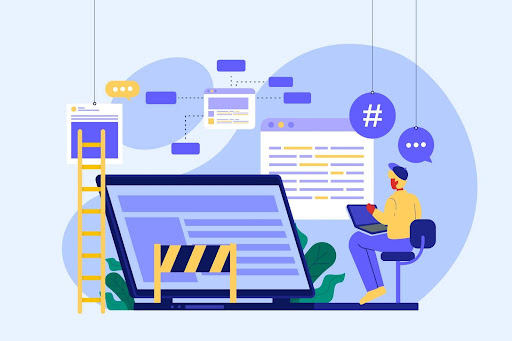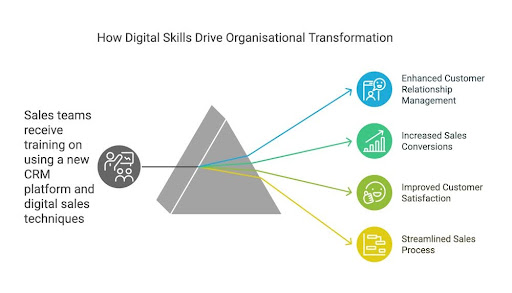What Is Digital Upskilling and How Can It Help Your Job?

Learn How to Begin Your Tech Transformation With Digital Upskilling
Are you keeping pace with the digital revolution? And, more importantly, are you confident your skills are staying relevant?
It's a fact: digital solutions are transforming the workplace. Businesses are now more efficient than ever, thanks to digital tools that provide incredible insights and automation that takes those tedious tasks that are prone to human error off our plates.
Of course, this shift brings up some valid concerns, especially for mid-career professionals. We're talking about things like job security and career longevity. It's perfectly understandable to feel a bit uneasy about adapting to the rapid pace of digital change. Concerns about skills becoming obsolete, grappling with new software, and general anxieties about job security are pretty common. That's precisely why embracing digital upskilling has become so essential.
What Is Digital Upskilling & How Can It Help Your Career?
Digital upskilling is about equipping yourself with the digital skills needed to thrive in a technology-driven world. This may include mastering new tools or developing entirely new skill sets like data analysis or coding. Investing in digital upskilling creates new opportunities for individuals, such as:
Future-proofing your career: Upskilling equips you with the skills needed for the jobs of tomorrow, making you more resilient to industry changes.
- Increasing your earning potential: Employees with in-demand digital skills often command higher salaries and better job opportunities.
Enhancing job performance: New skills can boost your productivity, efficiency, and problem-solving abilities.
In our digital economy, it's not just individuals who get a leg up. Employers also reap the rewards of a digitally upskilled workforce. By investing in their employees' development, companies can see a boost in productivity, improve employee retention, and attract top talent in a competitive market. It's about building a culture where everyone's always learning and improving, hitting those skills-based goals, and also tackling those big-picture transformational goals.

The Cause of Digital Skills Gap
"Skills gaps" refer to the mismatch between the skills employers need and the skills workers possess. This gap in digital skills and literacy stems from technology advancing at an incredible pace, leaving traditional education and training methods struggling to keep up.
Think of it like this: the jobs of tomorrow require skills that schools and universities might not even be teaching yet. This leaves businesses scrambling to find people with the right digital expertise. Without these skills, companies struggle to innovate, become less efficient, and may even lose ground to competitors. Projects can stall, customer service can suffer, and ultimately, growth can be stifled. This is why more and more employers are prioritising digital skills and why continual upskilling is so important for job seekers today.
Some Basic Digital Skills for Today’s Workspace
Bridging the skills gap and embracing digital transformation requires a focused approach to upskilling. But with a vast array of digital skills to acquire, where should individuals and organisations begin? Here are some specific skills that we can start to learn:
Digital Literacy
Digital literacy is the foundation of digital upskilling transformation. It involves the ability to use digital tools and technology effectively, including basic computer skills, internet navigation, and online communication. This is essential for navigating today's digital workplace and participating in the online world. For example, being proficient in using email, word processing software, and online collaboration tools is crucial for effective communication and teamwork.
Cybersecurity Awareness
Cybersecurity awareness is crucial for digital upskilling transformation. It involves understanding the importance of data protection, recognising potential cyber threats, and practising safe online behaviour. This helps individuals and organisations protect themselves from cyberattacks and data breaches.
Data Analytics
Data analytics is the process of collecting, cleaning, and analysing data to extract meaningful insights. This skill is increasingly valuable across various sectors as organisations rely on data-driven decision-making.
Data analytics can be especially beneficial for marketing and sales jobs, such as analysing customer data to help businesses understand consumer behaviour, improving marketing strategies, and personalising customer experiences. Digital upskilling with data analysis can range from basic spreadsheet analysis to complex statistical modelling.

Programming and Coding
Programming and coding involve writing instructions for computers to execute specific tasks. While slightly more complex, these skills are highly sought after in today's tech-driven world. They’re essential for developing software, websites, and applications. For example, learning Python can open doors to careers in web development, data science, and machine learning. This can be especially beneficial for those aspiring to technical roles.
Digital Marketing
Digital marketing encompasses various online strategies to promote products, services, or brands. It can range from basic social media management to complex search engine optimisation (SEO) techniques. This skill is crucial for businesses to reach their target audience online and drive growth.
Digital Skills in Demand
The specific type of digital skills in demand varies depending on the type of role and sector. However, it can typically be grouped into two categories: digital skills for technical roles and digital skills for non-technical ones.
Digital Skills for Technical Roles
Here are some in-demand digital skills for technical roles, which are constantly evolving:
Structured query language (SQL)
Data analytical skills
Cloud computing
Python programming language
Digital Skills for Non-Technical Roles
Here are some in-demand digital skills for non-technical roles, which are becoming increasingly important:
Analytical skills
Financial analysis
Financial reporting
Engineering
Researching
Digital marketing
Social media management
E-learning
How to Find the Right Digital Upskilling Course
1. Find Courses that Align with Your Career Goals or Skill Gaps
Finding the right digital upskilling course starts with understanding yourself and the skills needed to succeed. First, take stock of your existing skills and where you want to go in your career. Then, pinpoint the skills you need to develop or improve to reach your goals.
Next, research industry trends to ensure your acquired skills are in demand. Finally, analyse job descriptions for your target roles to identify the specific skills employers are looking for. By following these steps, you can choose digital upskilling courses that align with your career aspirations.2. Leverage Online Platforms and Employer Resources
There are numerous resources available to help you find the perfect digital upskilling course. Firstly, use the search filters on online learning platforms like Coursera, edX, and Udemy. These filters allow you to narrow down your options based on keywords related to your desired skills, industry, and career goals.
Secondly, explore any training opportunities offered by your current employer. Many companies provide internal training programmes, tuition reimbursement, or partnerships with external training providers. Additionally, leverage career development tools or platforms offered by your employer to assess your skill gaps and identify suitable digital upskilling courses.
Finally, don't forget to read course reviews and testimonials from other learners to gain insights into the quality and relevance of the courses you are considering.
Resources for Digital Upskilling
Free Online Resources
There are many free online resources that offer accessible and cost-effective ways to acquire new digital skills. These free resources include:
Massive Open Online Courses (MOOCs): MOOCs offer an affordable and flexible way to learn new digital skills, covering everything from cybersecurity to programming, at your own pace.
Industry-specific platforms: Platforms like Codecademy, freeCodeCamp, and edX offer free, interactive coding lessons and skill-building exercises tailored to specific tech domains.
Webinars and workshops: There are online and in-person webinars and workshops, such as those hosted by Vertical Institute, that cover a variety of tech topics.
Community groups: Connect with like-minded participants from courses and workshops to form community groups, fostering collaborative learning and peer support.
Paid Courses
Paid courses often provide more structured learning and in-depth content. These resources include:
SkillsFuture Credit courses: SkillsFuture courses allow Singaporeans to use credits to subsidise a wide range of approved digital upskilling courses.
Private training providers: Providers like @ ASK Training and Info-Tech Academy offer specialised, hands-on training and certifications in specific digital skills, often with industry-recognised credentials.
University short courses: Institutes such as the National University of Singapore and the Institute of Technical Education offer short or part-time courses, providing structured learning and academic rigor in focused digital skills areas.
Online course: Online course platforms like Coursera and Udemy offer a vast library of paid courses from reputable institutions and industry experts, providing flexible and comprehensive digital skills training.
On-the-Job Learning
Some workplaces also offer on-the-job upskilling opportunities, which can be highly effective for acquiring practical digital skills specific to your field. These usually come in the form of:
Internal training programmes
Mentorship and coaching
Project-based learning
Experimentation and innovation
Embrace Digital Upskilling for Your Career Success
Digital upskilling transformation is essential for navigating the evolving workplace and remaining competitive in a technology-driven world. Whether you are starting your career or seeking a mid-career change, acquiring in-demand skills can benefit your career trajectory.
If you're ready to embrace digital upskilling but don't know where to start, speak to our Skills Ambassadors today. Our Skills Ambassadors can help you kickstart your journey by identifying your skills needs and gaps, recommending courses that cater to your specific requirements, and directing you to assistance schemes to support your learning. Begin your digital upskilling journey today!
Posted on 7/2/2025 12:00:00 AM